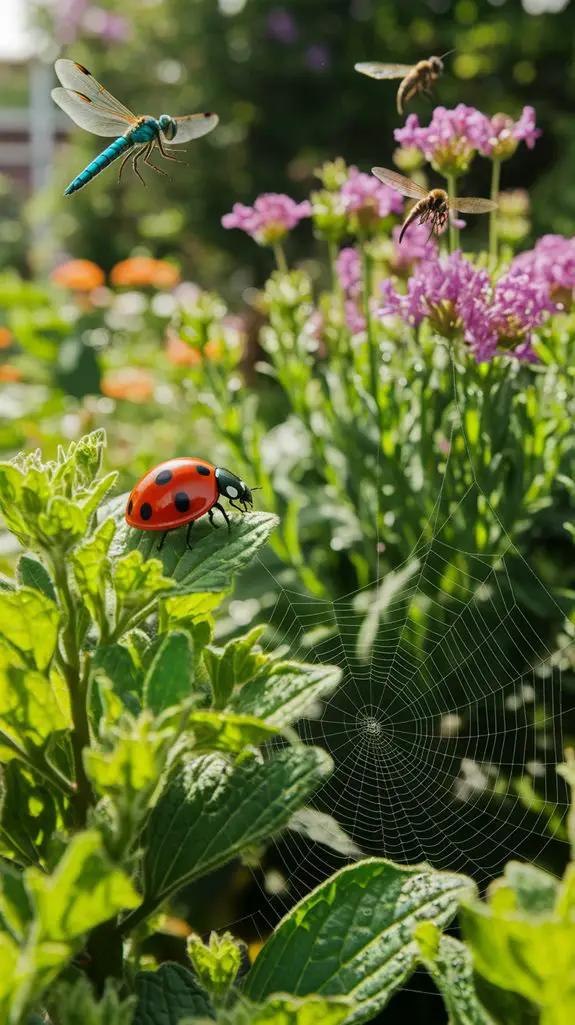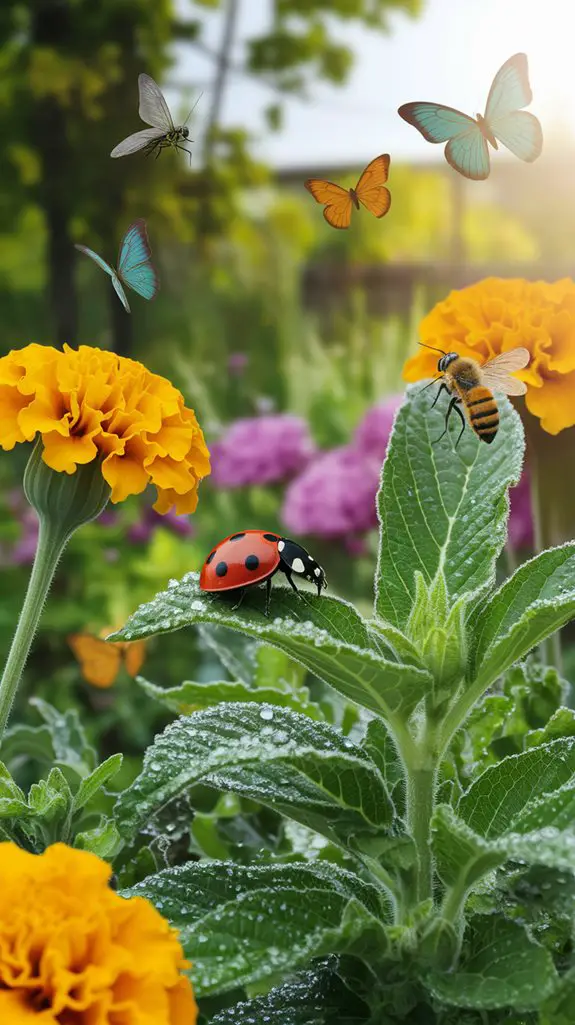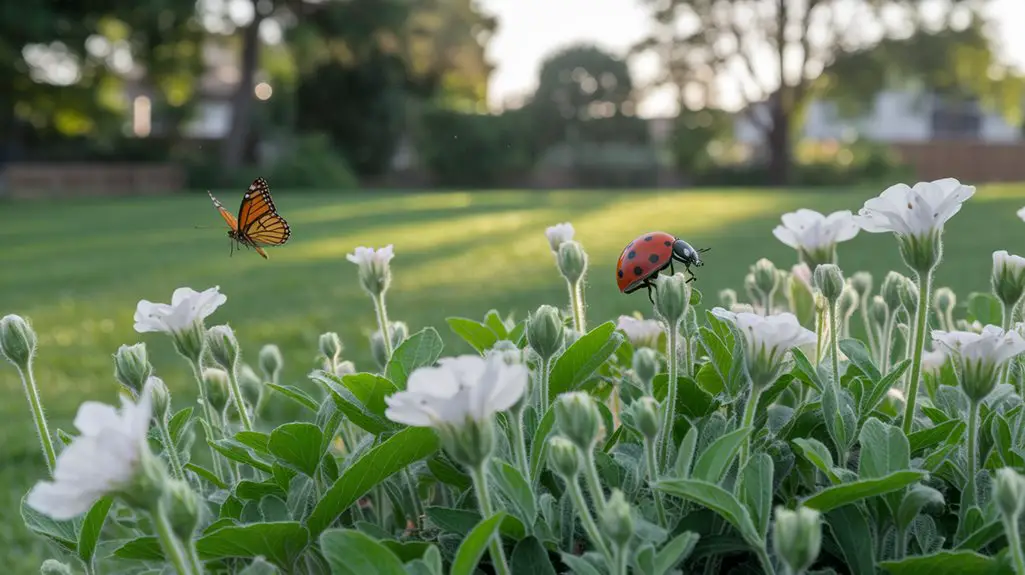When you’re choosing pest control methods for your yard, the impact extends far beyond simple bug elimination. Your choices affect your family’s health, local wildlife populations, and the surrounding water systems. Traditional pesticides introduce toxic compounds that can persist in soil for years, while chemical-free approaches work with nature’s existing systems. By understanding the full spectrum of options available, you’ll discover how effective pest management doesn’t require compromising environmental or personal wellbeing.
The Hidden Dangers of Traditional Chemical Pesticides
While conventional pesticides offer quick solutions to yard pests, they carry significant risks that extend beyond their target species.
Many commercial formulations contain neurotoxins and endocrine disruptors that can harm your family, pets, and beneficial wildlife. Children are especially vulnerable due to their developing systems and ground-level play.
These chemicals don’t discriminate—they kill beneficial insects like pollinators and predatory species that naturally control pest populations.
You’re also creating resistant “super pests” through repeated applications, requiring increasingly potent chemicals over time.
Runoff from treated yards contaminates local waterways, harming aquatic ecosystems and potentially entering drinking water supplies.
The residual effects can persist for years, accumulating in soil and disrupting the microbiome that supports plant health, creating a dependency cycle rather than a sustainable solution. Incorporating essential plants for organic pest prevention can provide a natural alternative to chemical pesticides.
Natural Predators: Your Garden’s Best Defenders

Nature offers a powerful solution to pest management right outside your door—an army of beneficial predators ready to defend your garden. These natural allies work tirelessly to control pest populations without chemical intervention.
| Predator | Target Pests | Attraction Method | Benefits |
|---|---|---|---|
| Ladybugs | Aphids, mites | Dill, fennel, yarrow | Consume 50+ aphids daily |
| Birds | Caterpillars, beetles | Birdhouses, water sources | Patrol gardens continuously |
| Praying mantis | Moths, flies, beetles | Tall grasses, shrubs | Each can devour 100+ insects weekly |
| Ground beetles | Slugs, cutworms | Rock piles, mulch | Night hunters that protect seedlings |
You’ll find these garden guardians work more effectively when you diversify your landscape. By creating microhabitats with native plants, water features, and shelter, you’re building a sustainable ecosystem that naturally regulates pest problems. Additionally, natural pest control solutions can enhance the effectiveness of these predators, leading to a healthier garden overall.
Plant-Based Solutions That Repel Unwanted Visitors

Instead of turning to synthetic chemicals for pest control, strategic planting of aromatic and companion species can create natural barriers throughout your yard.
Marigolds repel nematodes and deter aphids when planted near vegetables, while lavender keeps moths and fleas at bay. Basil not only enhances your cooking but also discourages flies and mosquitoes.
You’ll find mint effectively repels ants, rodents, and mosquitoes, though it’s best contained in pots due to its invasive nature. Nasturtiums act as trap crops for aphids, protecting your prized plants.
Chrysanthemums contain pyrethrum, a natural insecticide that combats roaches and ticks. For maximum effectiveness, arrange these plants in clusters around vulnerable areas or intersperse them throughout your garden beds. This integrated approach creates a thorough defense system that protects your yard while maintaining ecological balance. Additionally, incorporating organic pest control methods can further enhance the effectiveness of these natural strategies.
Creating a Balanced Ecosystem for Long-Term Pest Management
Creating a balanced ecosystem represents the cornerstone of sustainable pest management in your yard. When you establish biodiversity, you’re fostering natural checks and balances that regulate pest populations without chemical interventions. Beneficial predators like ladybugs, birds, and parasitic wasps become your allies in this ecological approach. Additionally, incorporating native plants for wildlife can enhance your yard’s ability to attract and sustain these beneficial organisms.
| Ecosystem Component | Benefit | Implementation Strategy |
|---|---|---|
| Native Plants | Attract pollinators & repel pests | Plant in clusters for maximum impact |
| Water Features | Support amphibians that eat insects | Install small ponds or bird baths |
| Diverse Habitats | House various beneficial organisms | Create layers with trees, shrubs, ground covers |
This holistic approach doesn’t just treat symptoms but addresses the underlying ecological imbalances causing pest problems. You’ll build resilience in your yard while reducing the need for any intervention over time.
Environmental and Health Benefits of Chemical-Free Approaches
While synthetic pesticides offer quick solutions, they introduce substantial risks to both ecological systems and human wellbeing that chemical-free approaches elegantly avoid. By choosing natural pest control methods, you’re protecting your family, pets, and local wildlife from harmful chemical exposure.
- Biodiversity preservation – Your yard becomes a sanctuary for beneficial insects, birds, and microorganisms that naturally regulate pest populations.
- Water protection – You’ll prevent toxic runoff that contaminates groundwater, streams, and broader watershed ecosystems.
- Reduced resistance development – Chemical-free methods circumvent the evolutionary arms race where pests develop resistance to synthetic pesticides.
- Natural pest management – Implementing natural ways to manage pests can further enhance your landscape’s resilience against infestations.
These approaches create a resilient yard ecosystem that works with nature’s existing balance rather than disrupting it, ensuring sustainable protection while supporting environmental health.
Conclusion
By switching to chemical-free pest control, you’re not just protecting your yard—you’re nurturing a living shield against unwanted visitors. Beneficial insects become your silent sentinels while native plants create natural barriers. This holistic approach strengthens your garden’s resilience, protects your family’s health, and preserves local waterways. You’ll contribute to a thriving ecosystem where balance, not chemicals, keeps pests in check naturally.




